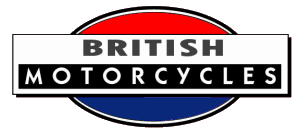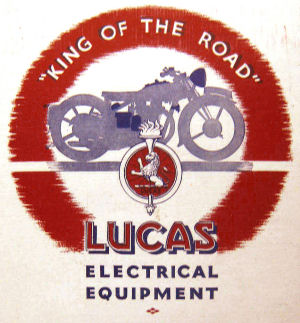Joseph Lucas Ltd
Great King Street, Birmingham, 19. Telephone: Northern 5201 (12 lines).
Telegraphic Address: "Lucas, Birmingham". (1937)
In 1897 a public company, Joseph Lucas Ltd was formed with a nominal share capital of £225,000 to take over the Lucas business. The company was registered on 12
November, to acquire the business of Joseph Lucas and Son, manufacturers of cycle lamps and other accessories.
1902 Supply by the company to the motor industry of non-electrical goods began, and was followed a few years later by the company's entry into the electrical field with the
manufacture of car batteries and dynamos, and lighting sets for sale to car owners. Oil lamp production began.
Joseph Lucas, Ltd.
On this firm's stand will be found several new lines in "Motorcyclealities," amongst which we note there will be several new designs in motor cycle lamps. In addition to the above, the firm are showing back carriers for motor bicycles, forced feed oilers, petrol squirts, copper funnels, and many other accessories useful to motor cyclists.
The Motor Cycle, November 18th, 1903. p801
Stanley Show 1903
1906 H. Johnson employed
1914 Manufacturers of dynamo lighting systems for motor cars, motoralities and cyclealities. Specialities: "Tom Bowling" ship lamps, motor car lamps, horns. Employees 1,600.
1914 Expansion in the manufacture of electrical equipment followed the company's acquisition for the sum of £9,000, of the share capital and business of Thomson-Bennett
which made magnetos. From this early takeover of the Thomson-Bennett magneto business stemmed the paramount interest of Lucas in the supply of electrical equipment for the motor
industry.
-
1914 The company began its main growth in 1914 with a bulk order contract to supply the Morris Motor Company with electrical equipment.
-
WWI The company was engaged principally in the manufacture of armaments (shells and fuses) and electrical equipment for aircraft and military vehicles. In this period it also began the
manufacture of starter motors which had by then been developed in America.
-
1920 October. Exhibited at the Commercial Motor Exhibition at Olympia with electric lighting and starting units.
-
From 1923 Mr. P. F. B. Bennett (later Lord Bennett of Edgbaston), one of the two former partners in the Thomson-Bennett business, and Mr. Oliver Lucas, a grandson of the founder
of the Lucas company, were until Mr. Lucas's death in 1948 Joint Managing Directors of the company. They established close personal relations with the principal vehicle
manufacturers and became leading personalities in the motor industry.
-
By 1923 over half its output of starting and lighting equipment was supplied to Morris. The value of the Morris business to Lucas is illustrated by the fact that in the four years
from 1921 to 1925, Morris's sales of vehicles jumped from 3,000 a year to 55,000. At the same time, however, Lucas was selling in increasing quantities to other manufacturers,
including Armstrong Siddeley, Rover, Standard and Triumph, with the result that by 1926 the proportion of Morris business to Lucas's total sales had dropped to about one-third.
-
1926 Acquired C. A. Vandervell and Co and Rotax.
-
In 1926, they gained an exclusive contract with Austin.
-
In 1926, Lucas obtained the contract for the following year for the whole
of Austin's requirements of starting, lighting and ignition equipment.
For the year 1925-26, Lucas's production of such electrical sets for supply as initial equipment averaged 2,000 a week.
-
Between 1920 and 1925 Lucas laid down the pattern of its present distribution
and service arrangements. It established its own depots in London, Liverpool,
Leeds, Edinburgh, Glasgow, Newcastle, Manchester, Birmingham, Bristol,
Dublin and Belfast for local distribution to wholesalers, traders and the
public and for service and repairs.
-
Between 1925 and 1929 a number of wholesale electrical stockists and repairers
were appointed as Battery Service Agents to stock, supply and service not
only Lucas batteries but also other Lucas motor vehicle goods, including
spare parts for repairs. Lucas also established a number of its own trade
and repair outlets which it operated through County Electrical Services,
a company it formed for the purpose through nominee shareholders. Lucas
did not publicly disclose its ownership of these outlets and has said that
the reason was that it wished to test customers' reactions to its products
and service, and that the information obtained through its own depots was
always coloured to some extent and not sufficiently reliable.
-
The development of the company in the inter-war years was marked not only
by rapid internal growth due to the increased demands of the vehicle manufacturers
but also by the acquisition of a number of other businesses and by certain
important agreements made with other electrical equipment manufacturers,
British and foreign. Lucas has said that amongst the reasons for its present
dominant position in the motor electrical industry are (i) that its competitors
got into financial difficulties with the collapse of the boom after the
first world war, (ii) that competitors were in a relatively worse position
than Lucas was when the American motor trade threatened to submerge the
British motor trade even in the British market (before the introduction
in 1915 of the McKenna duties) and (iii) that when the outlook was black
it acquired certain competitors who were in financial trouble. Lucas attaches
importance to the fact that among the businesses of which it acquired control
were its two biggest competitors C. A. Vandervell and Co and Rotax.
-
1927 Acquired B. L. I. C..
-
1929 Acquired A. Rist and Powell and Hanmer.
-
1930 Acquired M. L. Magneto Syndicate and North and Sons.
-
Around 1930, Lucas and Smiths
established a trading agreement to avoid competition in each others markets.
-
1937 Acquired Globe and Simpson and Bosch.
-
1937 British Industries Fair Advert for 'Leadership'. Battery; Car, Motorcycle
and Cycle Electrical and Non-Electrical Equipment. (Electricity: Industrial
and Domestic Section - Stand No. Cb.601)
-
1939 Acquired Express Magneto (Repairs) and Electrical Co.
-
1939 Opened new factory at Shaftmore Lane, Hall Green.
-
WWII Lucas produced electrical equipment for military and civil vehicles and for aircraft. Many of its standard products were adapted for war uses: for example, its windscreen-
wiper motors were used to operate aerial cameras and its starter motors were adapted for the electrical control of tank gun turrets. Outside its normal fields, Lucas produced a
wide variety of military requirements including gun turrets, aircraft wing sections, primers, fuses, anti-aircraft shells, bombs of various kinds, control and release mechanisms
and metal pressings. It also undertook research work for the Government, including research and development work on jet propulsion in factories it took over specially for the
purpose.
-
1943 Acquired David B. Irvine (Edinburgh).
-
1944 Acquired Avon Electrical Services.
-
1945 Acquired Bon Accord Electrical Repairs.
-
1949 Acquired Auto Services Electrical Co (Falmouth).
-
1953 Acquired Wrexham Motor and Electrical Engineering Co.
-
1954 Acquired Starting, Lighting and Ignition Services (Midlands).
-
1954 Acquired Auto Electric Services (Stourbridge).
-
1957 In addition, Lucas acquired in 1957 a 50 per cent, interest in Siba Electric.
-
1958 Acquired Cox and Co (R.W.).
-
1960 Acquired Harry Rawlings and Co.
-
1960 AA image on this page.
-
1961 Manufacturers of electrical equipment and accessories for motor-cycles, aircraft, cars, and cycles, including lighting sets, dynamos, dip and switch reflectors, horns, coil
ignition, batteries, magnetos, lamps, mirrors, windscreen wipers, hydraulic jacks, brakes, starters, wrenches and generators. Also manufacture fuel and combustion system equipment
for gas turbine engines and oil burning equipment for marine boilers.
-
1962 Acquired Gravesend Car Electrical Co.
-
1963 Motor Show exhibitor. Wide range of products.
-
1972 Centenary of company. Now employ 100,000 persons with 60 manufacturing
and distribution companies.
-
1996 Lucas Industries and the Variety Corporation of America merged to become LucasVariety plc.



